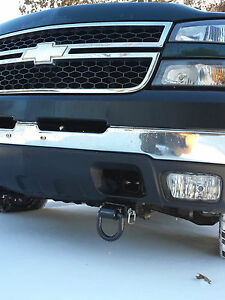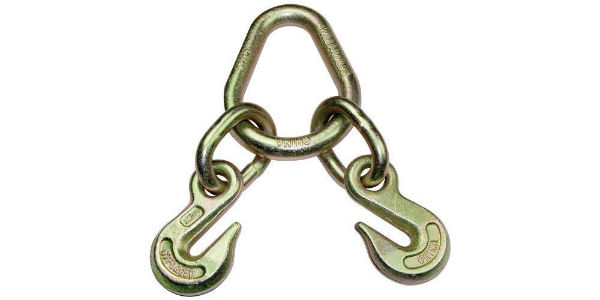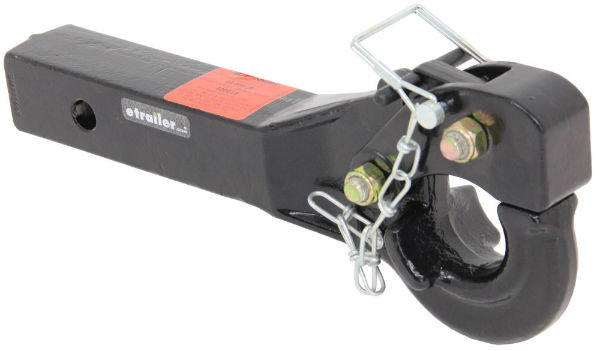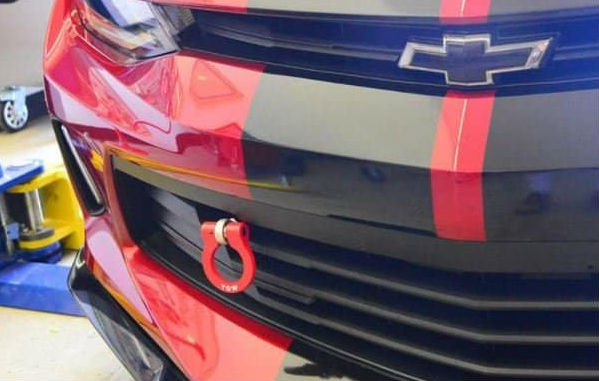This guide is meant to serve as a basic introduction to tow hooks and their use. In actual situations, it’s highly recommended to leave towing to experienced professionals – especially if you need an immobilized vehicle recovered.
It’s important to note that towing a vehicle or a piece of equipment is a potentially dangerous activity, even when done right. Improper towing of a vehicle, on the other hand, can result in damage to one or both vehicles. It can also result in serious injury, or even death.
WHAT ARE TOW HOOKS?
Tow hooks are basic tools you can attach to your vehicle so you can pull it safely. Tow hooks are used for towing vehicles, and using one or several of them is simply a much better choice than the alternative – hooking your tow chains or straps right on the wheel axles, the suspension or the bumpers.
When it comes to pulling a vehicle, the attachment points on the frame that these tow hooks go into are some of the few places designed to withstand the full force of the vehicle being pulled along. Tow hooks, once properly installed, will go a long way towards preventing damage to both vehicles and will help ensure that you can get your car to safety.
Tow hooks are also useful for vehicle recovery. When we talk about vehicle recovery, we generally refer to the task of moving a broken down or stuck vehicle to another place.
Simple recovery operations, like recovering a disabled vehicle stuck in the middle of the road, for example, can be easily done with a tow hook and ordinary towing chains, bars or straps. Depending on the situation, you can also use one or more tow hooks with recovery straps to pull out a vehicle stuck in mud or deep snow.
Tow hooks are also designed to minimize sway and vibration, which can again lead to damage to the vehicles. Your vehicle may already come with a tow hook in the trunk, but if it does not, then you can easily get a quality tow hook that will be the perfect fit for the towing or recovery system you plan to use.
Types Of Tow Hooks:
There are many types of tow hooks, and you can get aftermarket hooks as well as the ones made by the vehicle manufacturer. There are also a wide variety of styles you can choose from, and it’s always important to keep in mind that you need the right type of tow hook for the attachment points on your car.

Most vehicles can use a tow hook in the traditional bent hook shape that’s open on one side.
Aside from hooks, you can also have what is called a D-ring tow hook to have a more secure fit for a tow strap. Tow hooks may also come with a threaded end that lets you attach them to a recovery anchor on the front of your car and truck if you ever need to tow it.
There are many types and shapes of tow hooks designed for different functions, and you will need to match the right hook to the situation depending on the load they will need to carry. Some of the most common types of tow hooks in the market today include the grab hook, the pintle hook, and the racing hook.
Grab Hook: Grab hooks, which are also often referred to as mount tow hooks, are designed for heavy duty use. Hence you will often find them used with four wheel drive vehicles and heavy-duty trucks.

They are made to be robust and durable, and most of them come with a latch to secure the hook in place as the vehicle is being pulled along rougher terrain. One common reason for using a grab hook is for situations where a vehicle is stuck and can’t get out of sand or mud using just their own power – a grab hook is the ideal tow hook for an assisted recovery using another vehicle. Just like other types of tow hooks, grab hooks are also useful for towing along a disabled vehicle on the road, too.
If you and your vehicle are the ones doing the pulling, on the other hand, then you may also be able to get a tow hook that will fit into the rear frame receiver on the back of your vehicle. Tow hooks that are designed to go on the rear are often built to hold shackles, D-rings, chain extensions and more.
Pintle Hook: One common type of a tow hook designed for a tow vehicle is the pintle hook, and you will often see them at the rear of a truck or a large car hitched to a trailer. Pintle hooks, just like grab hooks, also have latches or jaw clip mechanisms that hold the trailer’s lunette ring securely in place. Pintle hooks and hitches are designed for heavy-duty pulling, but they are a great deal bulkier than other removable tow hooks.

Racing Hook: Lastly, you may have seen a racing tow hook on race cars or other similar types of sports vehicles. Racing tow hooks are as much a fashion statement as a practical accessory, and you will often find them sporting an anodized finish especially chosen to complement the car’s paint color.

Aside from the type and shape of your tow hook, another important thing you have to consider is the weight. As you might expect, you need the tow hook that’s rated for the weight of the vehicle being pulled – you don’t want a tow hook to break apart while you’re in the middle of a recovery pull!
That said, you will also need to make sure that your tow hook is just the right size for your receiver. A tow hook that’s too heavy for your vehicle will also be likely to be too thick for the receiver holes on the frame of your car.
Everyone wants to make sure that they are getting the best quality tools for their car, and tow hooks are no different. One good way to gauge the quality of your tow hook is by the type of coating that it comes with.
Bare metal tow hooks are good enough for occasional use, but having a tow hook with some form of rust protection is even better. Powder coating is a common type of durable coating, and there are other types of surface treatments as well.
What Are Tow Hooks Used for?
Tow hooks are used for towing as well as vehicle recovery. In the case of racing tow hooks, they are also used as accessories to enhance the aesthetic appeal of a vehicle, as well. You can still tow or recover a vehicle without the use of tow hooks – in fact, towing service providers that pull your vehicle away with a tow truck will usually use a wheel lift tow crossbar that holds on to the front or rear wheels of your car instead.
If you don’t have a lift tow crossbar, or a tow truck for that matter, then tow hooks plus a good set of recovery straps or towing chains can get you out of a sticky situation without risking damage to your car or to the vehicle doing the pulling.
Tow hooks are designed to do two things: distribute the force of the pull along a reinforced part of your car’s frame, and securely hold the towing chain or strap in place. That’s why it is important that you use a set of tow hooks that are specially designed for your car, as much as possible.
Fortunately, most if not all cars and trucks will come with a set of tow hooks provided by the vehicle manufacturer, and you can rest assured that those will fit perfectly on to the attachment points on your vehicle’s frame.
If your vehicle comes with a set of tow hooks, you may find them stowed away in a tool case underneath your boot cover. If you have a larger car or a truck, then it may come with larger tow hooks which you may find mounted on the frame under the hood, or along the rear. Check your vehicle owner’s manual for the specific location of your tow hooks.
Once you have figured out where your tow hooks are stowed away, remove them. Some tow hooks come with a treaded flat end which you can directly screw into one or more attachment ports behind your car’s bumper. Others may require you to install a safety bolt or pin to hold them in place with the help of tools. Again, your car manufacturer’s manual should be able to guide you along.
It’s possible that your vehicle may not come with a set of tow hooks, or that you or the previous owner has lost them some time ago. You may also find that your tow hooks are not in a state that they can be safely used – old, worn-out or rusted tow hooks should not be used at any time.
Fortunately, there is a wide selection of aftermarket tow hooks you can get to match your car’s specification. As much as possible, though, you should try to get the OEM replacement hooks for your car. The OEM tow hooks will have been certified by the vehicle manufacturer to be suitable to use for your particular model, making them a much safer choice in general.
What Are Front Tow Hooks For?
Front tow hooks are the tow hooks that go on the front of your car or truck. You need to install them on the front of your vehicle to provide the tow truck or another car with a secure attachment point for a tow rope or chain. Your front tow hooks are used for pulling your car out, that is, you put them on if your car is stuck or disabled, and you’ve got someone willing to pull your vehicle out.
Front tow hooks should not be used to pull someone out. Pulling a vehicle using a front tow hook also means you will be trying to snatch them out while going in reverse, which places a lot of strain on the drive train. If you need to pull someone out of a jam, then a rear tow hook is often a better choice.
What Are Racing Tow Hooks Used For?
Racing tow hooks are all but mandatory for track day events, and race track organizers will usually require that a participating vehicle have one installed on their vehicle. The tow hooks are supposedly there so that the towing vehicles at the track can quickly get your car to safety and out of the way of the other racers if your vehicle happens to be disabled in the middle of a lap.
They are designed to give a convenient attachment point for the tow truck operator, especially given that most track cars are too low to easily get access to the car’s frame.
As a result, racing tow hooks have become associated with track meet regulars, to the extent that aspiring racers have also started installing these hooks on their vehicles as a fashion statement as well. It’s now common to see racing tow hooks, in addition to racing spoilers and other accessories that are often associated with the hobby, on cars that may not even have spent time on a track.
That’s why racing tow hooks now often serve a decorative function, in addition to its more practical purpose of letting a tow truck pull you out to safety. Racing tow hooks now come in a wide variety of colors and styles to match just about any paint color.
